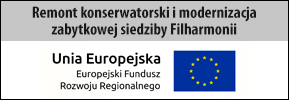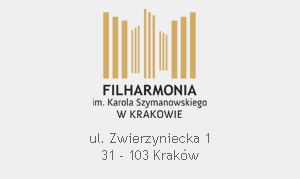



phone no.
506 625 430
open:
30-31.12 - 2pm-7pm

phone / fax no.
+48 504 856 500, + 48 504 063 337, + 48 12 619 87 22
e-mail:
RECITAL OF SONGS
.jpg)
enlarge
performer(s):
Olga Pasiecznik - soprano
programme:
pieces of Franciszek Maklakiewicz, Tadeusz Maklakiewicz, Jan Adam Maklakiewicz
The Maklakiewicz family of the Mszczonów area, Poland, occupies a special place in the history of the 20th-century Polish music. However, its position still awaits a more elaborate evaluation for at least two reasons. First, the fate of the Maklakiewicz brothers was tragically marked by history and a series of unfortunate events. Considered the most gifted in the family, Franciszek died in Poland’s defensive war of 1939, before his talent even had a chance to flourish. He was killed at the age of 24, but he had devoted the last five years of his life to music and composing. His elder brother, Jan Adam, also lived to be only 55 years old, with his life largely affected first by the experience of two world wars, and then the Stalinist era. The last and the youngest of the Maklakiewicz brothers, Tadeusz, was a composer as well as a dedicated pedagogue and social activist. All these circumstances had a significant impact on the music of the three Maklakiewicz brothers.
Second, neither of the three artists ever showed any interest in avant-garde trends, which may also explain why their contribution to Polish music has been largely neglected. All three received a thorough and comprehensive musical education, and they frequently engaged in the organisation of musical life (specifically, Jan Adam and Tadeusz). Nevertheless, they were not interested in pursuing novelty, preferring traditional music genres and forms.
Until recently, innovation in composition was what could ensure an artist’s presence on concert stages (particularly, but not exclusively, during the Warsaw Autumn Festival). Perhaps nowadays the time has come to look at 20th-century music from a broader perspective. Once we reject the ‘novelty’ criterion as the sole factor that determines the value of the work, we might notice that songs by the Maklakiewicz brothers are not only perfectly written in terms of the compositional métier, but are also beautiful and moving.
The songs to be presented at today’s concert draw from the tradition of Young Poland and Postromanticism, as evidenced by the authors of the texts: Kasprowicz, Tetmajer, and Staff. Interestingly, the song, while not very popular in the 20th century, played an important role in the artistic output of each of the Maklakiewicz brothers. The strongest traces of the late-Romantic legacy may be found in Franciszek’s works, who was born during the First World War and died defending his homeland in the early days of the Second World War. As a contemporary of Lutosławski and Panufnik, he graduated in 1936 from the class of famous Kazimierz Sikorski. However, his first composition (the song I Love You… to the text by Kazimierz Przerwa-Tetmajer, which opens the second part of the concert) dates back to 1934. During those five years of his life, the young composer wrote a dozen or so songs, several works of chamber and orchestral music, as well as a lot of film and theatre music. Franciszek’s songs, finally published in the 1980s as a result of the efforts of his younger brother Tadeusz, are typical examples of the longue durée of Romantic traditions in Polish music. Franciszek seems to continue the tradition of Karłowicz and early Szymanowski. The choice of texts, predominantly by poets from the Young Poland period, contributes to this impression.
It is difficult to predict how Franciszek’s artistic career would have developed had he not perished in September 1939 in the fights close to Łuków, Poland (where the composer is also buried). The youngest of the Maklakiewicz brothers, Tadeusz, born in 1922, first studied law and then composition with Tadeusz Szeligowski. Throughout his entire life, he combined his organisational and teaching functions with composing. Closely attached to Warsaw and the Warsaw Conservatory, for many years he was the school’s lecturer, as well as administrative director, dean, and eventually, its rector. Tadeusz’s first composition was performed at the Polish Music Festival in 1951. His songs presented at today’s concert were composed in the 1980s. Although significantly different in style from the songs by Franciszek and Jan Adam, they can hardly be called avant-garde and contain, at best, merely traces of Neoclassicism, which was so popular in the interwar period.
The oldest of the Maklakiewicz brothers, Jan Adam, born at the end of the 19th century, survived the war but died a year after Stalin’s death, i.e. before the Thaw in Polish music. Jan remains the most well-known member of the Maklakiewicz family, with his work well documented in Maria Wacholc’s insightful monograph. First a student of Roman Statkowski at the Warsaw Conservatory, he then continued his musical education with Paul Dukas in Paris, following Karol Szymanowski’s recommendation that young people should go to Paris because ‘this is where Paul Dukas teaches instrumentation like no one else, where the most outstanding teachers reside, and where all of the musical movement is focused’. Having returned from Paris, Maklakiewicz began teaching in Łódź and Warsaw. Shortly afterwards, in 1930, he composed the original Four Japanese Songs, which he himself listed among his most important works. The Songs are mainly known in the orchestral version where Maklakiewicz used quarter tones to emphasise the exotic nature of the composition. Naturally, he had to omit the quarter tones in the piano version; nevertheless, the original character of the piece was preserved. At that time, Asian inspirations were quite common among Polish composers (Piotr Perkowski, Maklakiewicz’s colleague from the Society of Young Polish Musicians in Paris, composed a series of songs Japanese Uta and Five Japanese Songs in 1924). Shortly before the war, Jan composed Three Vocalises, a study of different affects vocalised rather than expressed through a text.
After the war, the composer focused on his organisational functions. He became the director of the Cracow Philharmonic and later Warsaw Philharmonic. His Lullaby to the text by Konstanty Ildefons Gałczyński (for piano and voice, for male choir and mixed choir), available in three versions, comes from that time. The composer’s sudden death at the peak of his creative prowess leaves us with no answer to the question of how his oeuvre would develop after 1956. Would he remain faithful to his traditional style, or would he modernise his compositional devices under the influence of Warsaw Autumn? While this question cannot be answered, there is no doubt that the works by the three Maklakiewicz brothers, particularly their songs, are important compositions in the landscape of 20th-century Polish music. Especially if viewed from a different perspective than the modernist one.
Lech Dzierżanowski
Translated into English by Małgorzata Sobczak
Printable version
© Filharmonia Krakowska 2010










